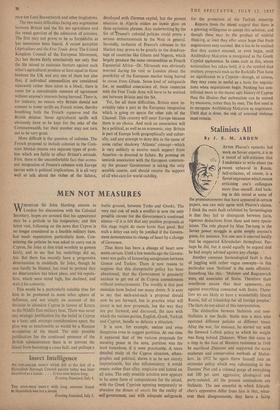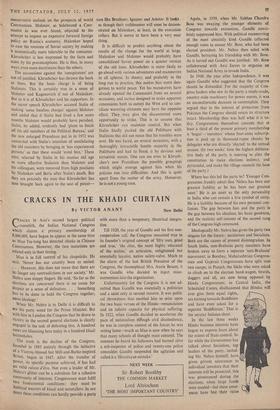Stalinists All
By J. E. M. ARDEN ---,..., AFTER Pharos's remarks last week on Soviet experts, it is in ' I undertake to write about the .. ) a mood of self-criticism that .4) recent upheaval In Russia.
Self-criticism, of course, is a ..) Soviet expression which means criticising one's colleagues more than oneself. And look- ing in this mood at sonic of the pronouncements that have appeared in certain papers, one can only agree with Pharos's claims. I think the main fault exhibited by Sovietologists is that they fail to distinguish between facts, rigorous deductions from them and mere specu- lation. The role played by Mao Tse-tung in the Soviet power struggle is quite simply anyone's guess, for instance. Yet one secs it asserted baldly that he supported Khrushchev throughout. Per- haps he did, but it could equally be argued that he had simply advised against any change.
Another common Sovietological fault is that of juggling with rather vague concepts—in this particular case 'Stalinist' is the main offender. Something like this : 'Molotov and Kaganovich were old associates of Stalin. Therefore their overthrow means that their opponents_ are against everything connected with Stalin. There- fore we are likely to have a wonderfully liberal Russia, full of friendship for all foreign peoples.' The facts do not admit of this interpretation.
The distinction between Stalinists and non- Stalinists is too facile. Stalin was a man who operated different policies at different times. After the war, for instance, he started out with the forward Leftish policy in which his weight was flung behind Zhdanov. When this came to a stop in the face of Western resistance in 1948 he sacrificed Zhdanov and supported the more moderate and conservative methods of Malen- kov. In 1952 he again threw himself into an extremist policy which was culminating in the Doctors' Plot and a colossal purge of everything not 100 per cent. aggressive, ideological and party-minded. All the present contendcnts are Stalinists. The one essential in which Khrush- chev's opponents differ from ,him is that, what- ever their disagreements, they have a fairly conservative outlook on the prospects of world Communism. Molotov, as hidebound a Com- munist as was ever found, objected to the attempt to impose an expensive forward foreign policy on Russia's economy. Malenkov hoped to ease the tensions of Soviet society by making it economically more tolerable to the consumer. Khrushchev is less impressed by the facts and more by his preconceptions. He is thus, in many ways, even more doctrinaire than the others.
The accusations against the `conspirators' are not all justified. Khrushchev has thrown the book at them. But the basic charge is of being Stalinists. This is certainly true in a sense of- Molotov and Kaganovich if not of Malenkov. But so it is of Khrushchev and his supporters. In the secret speech Khrushchev accused Stalin of making `some baseless charges' against Molotov and added that if Stalin had lived a few more months Molotov would probably have perished. Stalin, he added, evidently had `plans to finish off the old members of the Political Bureau,' and the new enlarged Presidium put in in 1952 was connected with Stalin's intention of annihilating the old members by bringing in less experienced persons' so that these would `extol him.' These men, selected by Stalin in his maniac old age as more effective Stalinists than Molotov and his colleagues, were removed from high positions by Malenkov and Beria after Stalin's death. But they are precisely the men that Khrushchev has now brought back again to the seat of power— men like Brezhnev, Ignatov and Aristov. It looks as though their ruthlessness will soon be demon- strated on Malenkov, at least, in the execution cellars. But it seems to have been a very near thing.
It is difficult to predict anything about the results of the change for the world at large. Malenkov and Molotov would probably have consolidated Soviet power on a quieter version of the old lines. Khrushchev is more likely to go ahead with various adventures and manoeuvres in all spheres. In theory, and probably in the long run in practice, this makes him more dan- gerous to world peace. Yet his manoeuvres have already opened the Communist front on several occasions, and tactics designed to make apparent concessions both to outwit the West and to con- ciliate wavering elements may have the opposite effect. They may give the discontented more opportunity to strike. This is to assume that Khrushchev can maintain control. But when Stalin finally packed the old Politburo with Stalinists this did not mean that his troubles were over. He was faced, on several occasions, with a thoroughly intractable hostile majority in the Politburo and had to Break it by devious and terroristic means. One can see even in Khrush- chev's new Proesidium the possible groupings which might ' emerge against him when his policies run into difficulties. And this is quite apart from the matter of the army. Moreover, he is not a young man.















































 Previous page
Previous page